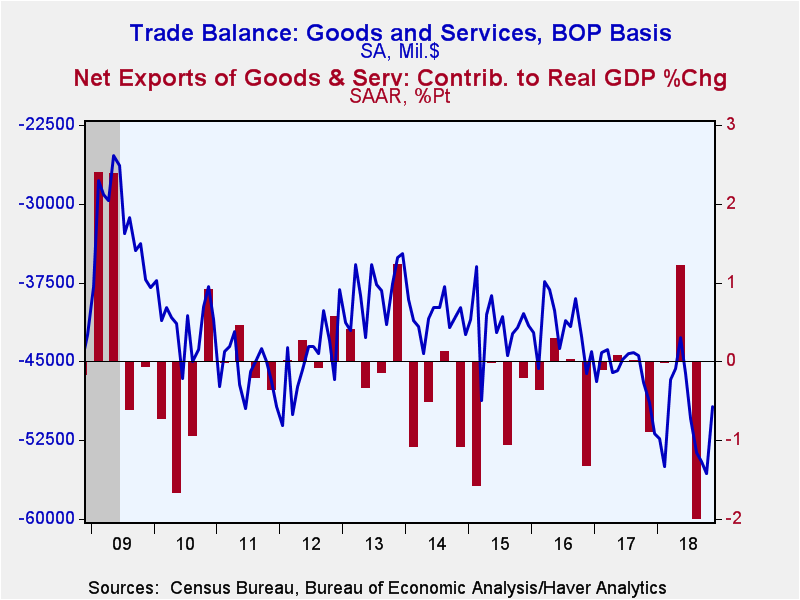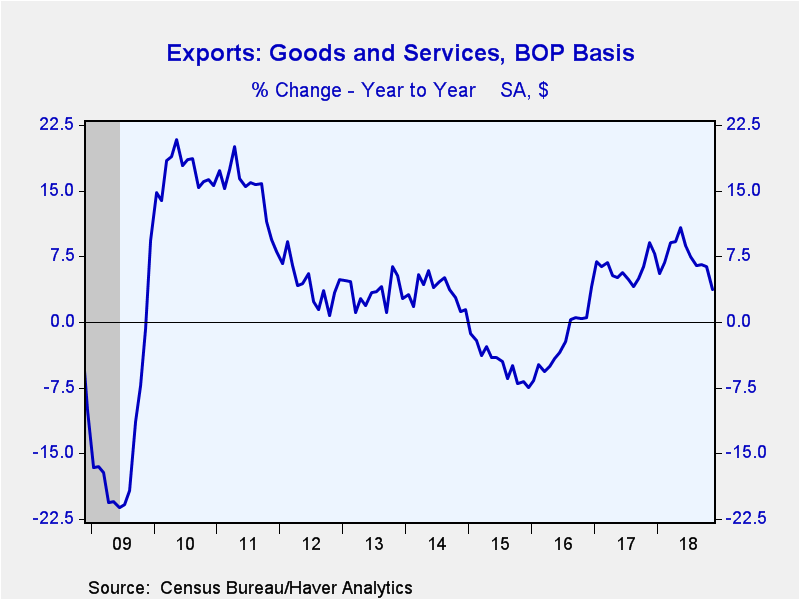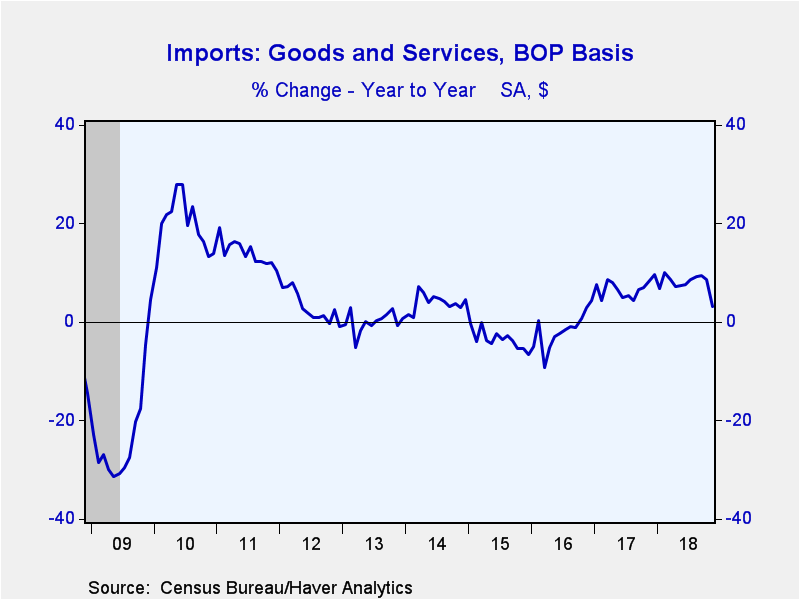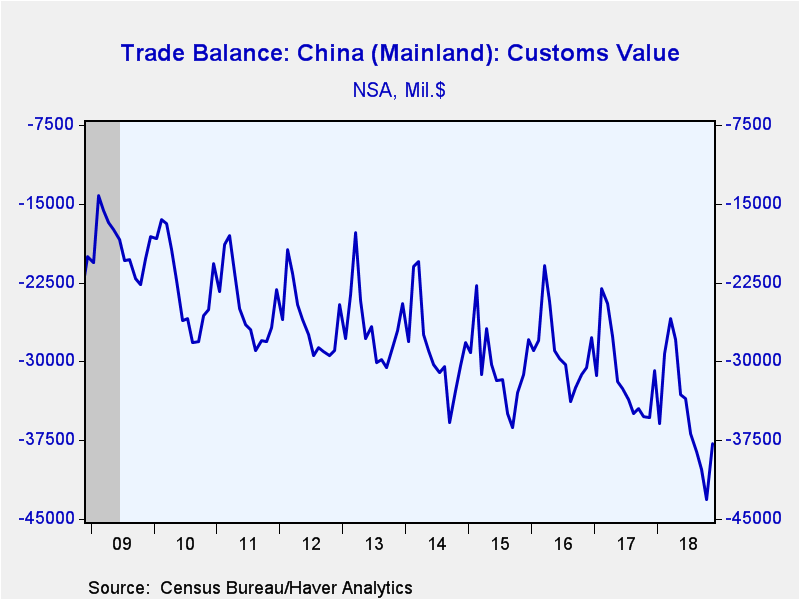 Global| Feb 06 2019
Global| Feb 06 2019U.S. Trade Deficit Narrows As Oil Prices Fall
by:Tom Moeller
|in:Economy in Brief
Summary
The U.S. trade deficit in goods and services lessened to $49.31 during November from $55.70 billion in October, revised from $55.49 billion. A deficit of $54.0 billion had been expected by the Action Economics Forecast Survey. Exports [...]
The U.S. trade deficit in goods and services lessened to $49.31 during November from $55.70 billion in October, revised from $55.49 billion. A deficit of $54.0 billion had been expected by the Action Economics Forecast Survey. Exports declined 0.6% (+3.7% y/y) after an unrevised 0.1% easing in October, while imports fell 2.9% (+3.2% y/y) after a 0.4% gain in October, revised from 0.2%.
The real (inflation-adjusted) goods trade balance narrowed to $80.8 billion in November from a record $88.3 billion in October.
The deficit in goods trade declined to $70.5 billion in November from a record $77.1 billion in October. Exports of goods declined 0.9% (+4.6% y/y), but rose slightly in real terms. Foods, feeds and beverage exports rebounded 0.6% (-2.2% y/y) following four months of sharp decline. Auto exports fell 3.0% (-8.8% y/y) after a 1.9% drop, while non-auto capital goods exports weakened 5.0% (+1.4% y/y). Industrial supplies exports fell 2.9% (+11.4% y/y). Exports of petroleum declined 3.8% (+31.7% y/y) as prices fell. Constant dollar petroleum exports increased 6.4% m/m and by nearly one-quarter y/y.
Imports of goods decreased 3.6% (+3.4% y/y) in November after rising for six straight months. In constant dollars, imports fell 3.0% (+1.9% y/y) after little change in October. Nonauto consumer goods imports declined 7.5% (+2.2% y/y). Foods, feeds and beverages imports fell 1.2% (+3.8% y/y) while imports of capital goods improved 0.6% (1.8% y/y). Imports of automobiles gained 0.8% (6.4% y/y) and have risen steadily since May. Industrial supplies imports declined 6.9% (+2.4% y/y) but fell 5.2% in real terms (-4.1% y/y).
Petroleum imports declined 14.6% (-1.8% y/y) and by 10.7% in real terms (-14.1% y/y). Nonpetroleum imports were off 2.5% (+3.8% y/y) and 2.2% in real terms (+3.5% y/y). The price per barrel of crude oil declined to $57.54 from $61.23. It was down from an average $101.02 in 2012.
The surplus on services trade declined to $22.3 billion in November, the smallest surplus in nine months. Services exports eased 0.2% m/m (+2.2% y/y) as travel exports fell 0.2% (+0.7% y/y) and charges for the use of intellectual property eased 0.1% (+0.9% y/y). Imports of services rose 0.3% (1.9% y/y) as travel imports increased 2.3% (9.1% y/y). Imports of charges for the use of intellectual property rose 0.3% (-4.6% y/y).
The trade deficit with China declined to $37.9 billion (NSA) in November. Exports to China fell 5.1% (-32.1% y/y), the fourth sharp decline in five months. Imports declined 10.9% (-3.3% y/y) after a 4.4% rise. The trade deficit with Japan narrowed to $5.8 billion. Exports rose 18.5% y/y and imports gained 9.9% y/y. The trade deficit with the European Union narrowed to $15.1 billion. Exports increased 14.3% y/y and imports rose 9.9% y/y.
The international trade data as well as oil prices can be found in Haver's USECON database. Detailed figures on international trade are available in the USINT database. The expectations figures are from the Action Economics Forecast Survey, which is carried in AS1REPNA.
| Foreign Trade in Goods & Services (Current $) | Nov | Oct | Sep | Y/Y | 2017 | 2016 | 2015 |
|---|---|---|---|---|---|---|---|
| U.S. Trade Deficit ($ bil.) | 49.31 | 55.70 | 54.56 | 48.95 (11/17) |
552.28 | 502.00 | 498.53 |
| Exports of Goods & Services (% Chg) | -0.6 | -0.1 | 1.5 | 3.7 | 6.1 | -2.2 | -4.6 |
| Imports of Goods & Services (% Chg) | -2.9 | 0.4 | 1.5 | 3.2 | 6.8 | -1.7 | -3.5 |
| Petroleum (% Chg) | -14.6 | -2.7 | -1.6 | -1.8 | 27.2 | -19.5 | -45.5 |
| Nonpetroleum Goods (% Chg) | -2.5 | 0.5 | 2.1 | 3.8 | 5.6 | -1.2 | 2.2 |
Tom Moeller
AuthorMore in Author Profile »Prior to joining Haver Analytics in 2000, Mr. Moeller worked as the Economist at Chancellor Capital Management from 1985 to 1999. There, he developed comprehensive economic forecasts and interpreted economic data for equity and fixed income portfolio managers. Also at Chancellor, Mr. Moeller worked as an equity analyst and was responsible for researching and rating companies in the economically sensitive automobile and housing industries for investment in Chancellor’s equity portfolio. Prior to joining Chancellor, Mr. Moeller was an Economist at Citibank from 1979 to 1984. He also analyzed pricing behavior in the metals industry for the Council on Wage and Price Stability in Washington, D.C. In 1999, Mr. Moeller received the award for most accurate forecast from the Forecasters' Club of New York. From 1990 to 1992 he was President of the New York Association for Business Economists. Mr. Moeller earned an M.B.A. in Finance from Fordham University, where he graduated in 1987. He holds a Bachelor of Arts in Economics from George Washington University.
More Economy in Brief
 Global| Feb 05 2026
Global| Feb 05 2026Charts of the Week: Balanced Policy, Resilient Data and AI Narratives
by:Andrew Cates










